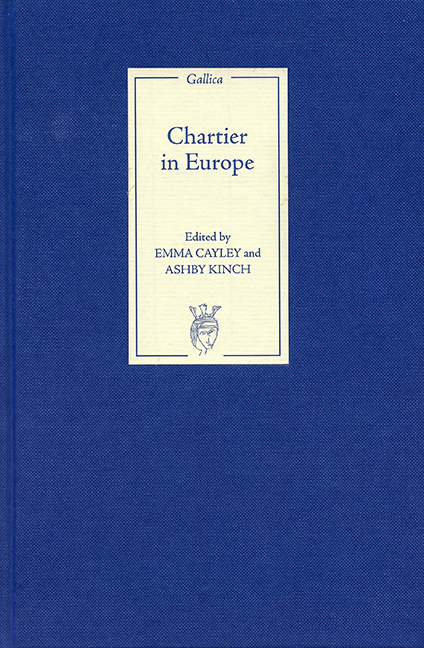Book contents
- Frontmatter
- Contents
- Foreword
- List of Contributors
- Acknowledgements
- List of Abbreviations
- Introduction
- Part I Authorising Chartier
- Part II Transmitting Chartier
- 5 ‘Ainchois maintien des dames la querelle’: Poetry, Politics and Mastery in the Manuscript Tradition of Alain Chartier
- 6 Cyclification and the Circulation of the Querelle de la Belle Dame sans mercy
- 7 The Early Reception of Chartier's Works in England and Scotland
- Part III Translating Chartier
- Bibliography
- Index
- Miscellaneous Endmatter
7 - The Early Reception of Chartier's Works in England and Scotland
from Part II - Transmitting Chartier
Published online by Cambridge University Press: 24 October 2017
- Frontmatter
- Contents
- Foreword
- List of Contributors
- Acknowledgements
- List of Abbreviations
- Introduction
- Part I Authorising Chartier
- Part II Transmitting Chartier
- 5 ‘Ainchois maintien des dames la querelle’: Poetry, Politics and Mastery in the Manuscript Tradition of Alain Chartier
- 6 Cyclification and the Circulation of the Querelle de la Belle Dame sans mercy
- 7 The Early Reception of Chartier's Works in England and Scotland
- Part III Translating Chartier
- Bibliography
- Index
- Miscellaneous Endmatter
Summary
Following the history of the English reception of Alain Chartier's works affords the opportunity to survey both synchronically and diachronically something of the history of Anglo-French and Franco-Scottish cultural exchange in the fifteenth and early sixteenth centuries. Certain of Chartier's works were known in both England and Scotland for a long time. They circulated in French, in manuscripts written in France and brought to England, and were in some instances translated into English and/or Scottish versions. Some were among the earliest works to be printed in England and in Scotland, and their availability in later printed copies secured them still longer life on into the sixteenth century. The length of time over which the works were produced and read means that as a group these ‘English’ works constitute a useful body of evidence for anyone concerned with the cultural implications of translation and reception during the decades in which the Middle Ages turned into the early modern period.
Work undertaken by James Laidlaw and Margaret S. Blayney has gone a considerable way to uncovering the networks which brought Chartier's works to the attention of English readers, and the forms in which they were transmitted. The fruits of this research mainly concern La Belle Dame sans mercy and a group of prose works, translations of Le Quadrilogue invectif, Le Livre de l'Esperance, and the Latin Dialogus familiaris amici et sodalis, all of which survive in translation in multiple manuscript copies. Some information about English and Scottish readership of French copies of these and other of Chartier's works, and of further translations, can also be pieced together. It is clear not just that Chartier had a perceptible Anglo-Scottish reputation, but also that this reputation derived from two particular clusters of interest: one concerning the BDSM, and the other the works of secular political council which were to seem especially pertinent to the situation in England during the later part of the reign of Henry VI (1422–61, 1470–71). ‘Mayster Aleyn’ (as Chartier is called in the prologue to the English translation of the BDSM) seems to have become a source of objective wisdom, whose credentials as a royal clerk/secretary and notary may have lent a special weight to writings associated with his name.
- Type
- Chapter
- Information
- Chartier in Europe , pp. 105 - 116Publisher: Boydell & BrewerPrint publication year: 2008

